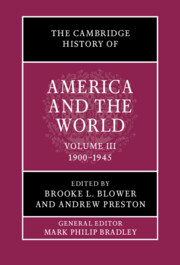Book contents
- The Cambridge History of America and the World
- The Cambridge History of America and the World
- The Cambridge History of America and the World
- Copyright page
- Contents
- Figures
- Maps
- Contributors to Volume III
- General Introduction: What is America and the World?
- Introduction to Volume III
- Part I American Power in the Modern Era
- Part II Competing Perspectives
- Part III The Perils of Interdependence
- 21 Borders and Migrants
- 22 Economic Catastrophes
- 23 Corporate Imperialism and the World of Goods
- 24 The Body Politics of US Imperial Power
- 25 Agriculture and Biodiversity
- 26 Worlds of International Development
- 27 Preserving Peace and Neutrality
- 28 The American Way in World War II
- 29 The Republic of Science and the Atomic Bomb
- 30 Visions of One World
- Index
29 - The Republic of Science and the Atomic Bomb
from Part III - The Perils of Interdependence
Published online by Cambridge University Press: 12 November 2021
- The Cambridge History of America and the World
- The Cambridge History of America and the World
- The Cambridge History of America and the World
- Copyright page
- Contents
- Figures
- Maps
- Contributors to Volume III
- General Introduction: What is America and the World?
- Introduction to Volume III
- Part I American Power in the Modern Era
- Part II Competing Perspectives
- Part III The Perils of Interdependence
- 21 Borders and Migrants
- 22 Economic Catastrophes
- 23 Corporate Imperialism and the World of Goods
- 24 The Body Politics of US Imperial Power
- 25 Agriculture and Biodiversity
- 26 Worlds of International Development
- 27 Preserving Peace and Neutrality
- 28 The American Way in World War II
- 29 The Republic of Science and the Atomic Bomb
- 30 Visions of One World
- Index
Summary
Science is an enterprise that deplores boundaries. There is not much point, for instance, in trying to do nuclear physics without chemistry, and it would be foolish for scientists to pretend that they can work in isolation according to state borders, as if (say) mathematicians of different nationalities are somehow engaged in studying separate, national strains of their subject. Ecosystems are not confined by human-imposed lines of demarcation; seas lap on many shores. The Hungarian Jew Michael Polanyi, a polymath educated in Germany and with a long teaching career in Britain, wrote at mid-twentieth century of “a republic of science,” in which scientists worked together across and despite nation-states, trying to solve common problems. “The Republic of Science,” he wrote, “is a Society of Explorers.” Science presented a jigsaw puzzle, the pieces of which could be most efficiently assembled through group effort, each scientist working from his perspective or with her expertise. “The authority of scientific opinion remains essentially mutual,” Polanyi wrote. “Any authority which would undertake to direct the work of the scientist centrally would bring the progress of science virtually to a standstill.”1 The republic required sharing knowledge. It spurned hierarchy. It did not supplant but transcended the state.
- Type
- Chapter
- Information
- The Cambridge History of America and the World , pp. 684 - 701Publisher: Cambridge University PressPrint publication year: 2022

